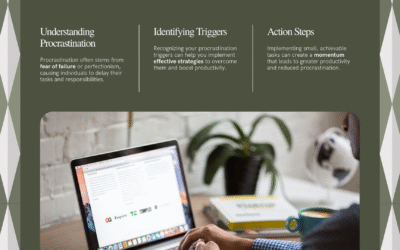Procrastination Unpacked

The act of delaying tasks or decisions, is a universal human experience
Procrastination and its psychology
Procrastination is a conscious decision to delay tasks. Repeating Behavior while knowing negative consequences and Impacts. It effects our performance and mental health. Procrastination is not only a time management issue. It’s a complex interplay of emotions, cognitive processes, and behavioral patterns.
Is Procrastination a Mental Illness?
- Itself Procrastination is not a mental illness. But in some cases, it may be underlying mental health condition such as depression, OCD, or ADHD.
- Depression; Feeling of helplessness, lack of energy, self doubt.
- OCD; recurring, intrusive thoughts (obsessions) and repetitive behaviors (compulsions).
- ADHD: Hyperactivity, and impulsivity
Let’s explore psychological factors that contribute to procrastination one by one
- Emotional Regulation: We face hard tasks on daily basis. Sometime we have dead line to do right now. Many time tasks perceived as boring, overwhelming, or anxiety-inducing can trigger avoidance behaviors. we start postponing the task. But individuals experience short-term relief and face long-term stress and other psychological disturbance.
- Cognitive Distortions: Living in current era we have less attention spam. which distorted our thinking patterns. Perfectionism and fear of failure are common cognitive distortions that fuel procrastination. For example, someone might think, “If I can’t do this perfectly, there’s no point in starting.”
- Temporal Discounting: Humans immediate prioritize rewards over future benefits because they wired for it. Watching a TV show now often feels more appealing than preparing presentation, tomorrow.
- Identity and Self-Perception: Procrastination can also linked to one’s self-concept. “Procrastinators” may reinforce this identity through repeated delaying behaviors.
Types of Procrastinators
All procrastinator do not delay their work due to psychological issues. Most of the time they delayed their work to do best. Understanding the types of procrastinator will help us to know better :
- The Perfectionist: I think a perfectionist delay to avoide flaws. Hesitate to convey, work’s not perfect, so I wait, and miss deadlines, stuck in anxious state.
- The Overwhelmed Avoider: Feels paralyzed by the magnitude of tasks. Maybe because they are avoidant to take big task.
- The Thrill-Seeker: Waiting for changing deadline date. Happening of unusual which may cause cancellation of deadline. Thrives on last-minute pressure and deadlines.
- The Defier: They resists tasks that feel imposed or lack personal significance.
- The Overcommitter: Lack of assertiveness. They think they can complete this task while commiting task. Juggles too many responsibilities and postpones less urgent o
Why we keep putting things off, despite the consequences
The Neuroscience of Procrastination
Procrastination is rooted in the brain’s reward and decision-making systems. Our prefrontal cortex, responsible for planning and impulse control. Often finds itself at odds with the limbic system, which drives immediate gratification. When the emotional brain outweighs the rational brain, procrastination ensues.
Brain imaging studies shown heightened activity in the amygdala. when individuals face tasks they’d rather avoid. Amygdala associated with emotional processing. Understanding these neural mechanisms can help us devise strategies to rewire our habits. I prefer hypnotherapy techniques which helps clients to achieve their goals.
The Costs of Procrastination
Procrastination has far-reaching consequences beyond missed deadlines. These include:
- Increased Stress: Procrastination often leads to last-minute rushes and heightened anxiety.
- Diminished Productivity: Delaying tasks reduce efficiency and overall output.
- Harmed Relationships: Procrastination can strain personal and professional relationships. especially when commitments are finalized
- Lowered Self-Esteem: Continueosly delaying can create feelings of inadequacy and self-doubt.
Strategies to Overcome Procrastination
Overcoming procrastination requires a multi-faceted approach. Addresses its emotional, cognitive, and behavioral roots. Here are some evidence-based strategies:
1. Practice Self-Compassion
Researches shows that self-compassion reduces procrastination. by alleviating the harsh self-criticism that often accompanies delays. Instead of berating yourself for procrastinating, adopt a gentle and forgiving mindset.
2. Break Tasks into Smaller Steps
Large tasks can feel overwhelming. Breaking them into manageable steps makes them less daunting and more actionable.
For example, You have to remember phone number, divide it in chunks and then remember it.
3. Set Specific and Realistic Goals
“I’ll work on my project today” is less effective than specific plans such as “I’ll write the introduction from 10:00 to 11:00 AM.”
4. Use the Pomodoro Technique
Studies showed that this technique is more effective than others. This time-management method involves working for 25-minute intervals followed by short breaks. It creates a sense of urgency and minimizes distractions. That’s why its powerful.
5. Leverage Accountability
Sharing your goals with a trusted friend, mentor, coach can provide external motivation. Regular check-ins can keep you on track.
Rewire your focus from perfection to progress.
Remind yourself that starting imperfectly is better than not starting.
7. Hypnotherapy
My experience a hypnotherapist, profound impact hypnosis can have on addressing procrastination. Through guided relaxation and positive suggestions. hypnosis can help reprogram subconscious beliefs, reduce anxiety, and enhance focus.
8. Minimize Distractions
Create an environment conducive to productivity by removing distractions. Turn off notifications, declutter your workspace.
9. Adopt “Temptation Bundling”
Combine less enjoyable tasks with enjoyable activities. For example, listen to your favorite podcast while organizing your workspace.
10. Visualize Success
Engage in mental imagery by visualizing the successful completion of tasks. This can boost motivation and reduce task aversion.
The Role of Therapy in Addressing Procrastination
For individuals struggling with procrastination, therapy can be a transformative tool. Cognitive-behavioral therapy (CBT) is effective in identifying and challenging the thoughts and beliefs that drive procrastination. Hypnotherapy, mindfulness-based practices, and solution-focused approaches also provide valuable pathways for change.
Cultivating Long-Term Habits
Breaking free from procrastination is not an easy task. It requires consistent effort and a commitment to change. Remember, rewiring your mind is not easy. It’s a ongoing process. Here are some tips for cultivating long-term habits:
- Celebrate Small Wins: Acknowledge and reward progress, no matter how minor it may seem.
- Reflect and Adjust: Regularly assess what strategies work for you.
- Focus on Identity Change: Instead of aiming to complete tasks, aim to become prioritizes timely.
- Maintain a Growth Mindset: View setbacks as opportunities.
Conclusion
Procrastination is more than a mere habit. it’s a reflection of deeper psychological and emotional dynamics. By understanding its roots and employing targeted strategies, you can reclaim your time and lead a more purposeful life. Remember, the journey to overcoming procrastination is not about perfection but progress. As you take small, consistent steps, you’ll discover the power within you. Help you to transcend delays and embrace action.
As a therapist, I encourage you to explore these strategies with curiosity and self-compassion. If procrastination feels like a barrier, consider seeking professional guidance. Together, we can unravel the complexities of procrastination.


